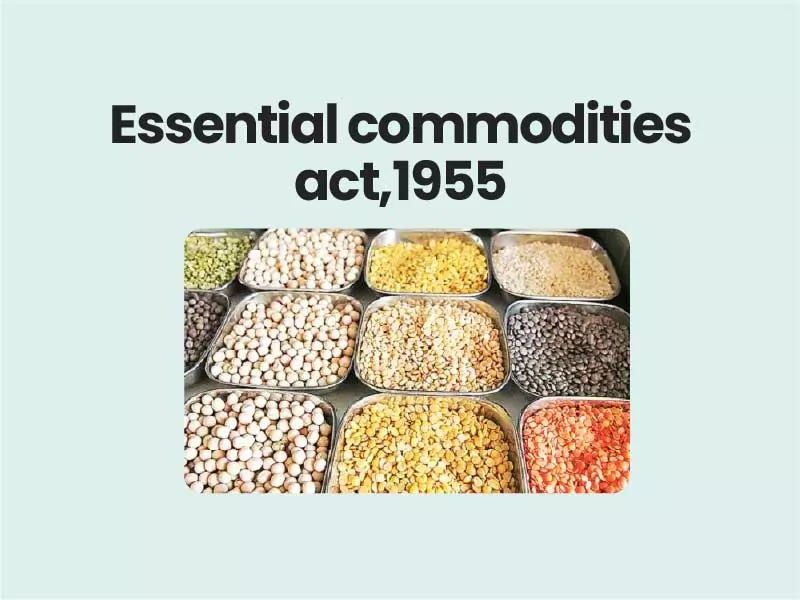Companion@360 → 7 Month programme to sharpen your writing skills → REGISTER NOW

Amendment to Essential commodities act,1955
The Essential Commodities Act (ECA) was enacted by the Central Government in 1955 to control and regulate trade and prices of commodities declared essential under the Act.
- The Act empowers the Central and state governments concurrently to control production, supply and distribution of certain commodities in view of rising prices.
- The act was intended to prevent hoarding, black marketing that create artificial scarcity and profiteering.
- The act covers commodities such as petroleum products, drugs& medicines, food items, fertilisers, jute and textiles.
- While India has become surplus in most agri-commodities, essential commodities Act act as barrier for farmers. They have been unable to get better prices due to lack of investment in cold storage, processing and export as the entrepreneurial spirit gets dampened due to hanging sword of Essential Commodities Act
- With this amendment to the six-a-and-half decade old Essential Commodities Act that deregulates food items, including cereals, pulses and onion, from list of essential commodities, will transform the farm sector and help raise farmers’ income
- This will remove fears of private investors of excessive regulatory interference.
- The Farming Produce Trade and Commerce (Promotion and Facilitation) Ordinance, 2020
- At present farmers have restrictions on where to sell and whom to sell the agriculture produce. He can sell his products in identified Mandi’s only. This subject farmers to exploitation by intermediaries and hinder better price realisation by farmers.
- The Farming Produce Trade and Commerce (Promotion and Facilitation) Ordinance, 2020 aims to open up agricultural marketing outside notified mandis under state agricultural produce marketing legislations for farmers, and also remove barriers to inter-State trade.
- This will help create an ecosystem where farmers and traders can enjoy freedom of choice of sale and purchase of agri-produce.
- It also proposes an electronic trading in transaction platform for ensuring a seamless trade electronically
- Creation of additional trading opportunities help farmers get remunerative prices due to additional competition.
- It will certainly pave the way for creating ‘One India, One Agriculture Market’
- The Farmers (Empowerment and Protection) Agreement on Price Assurance and Farm Services Ordinance, 2020
- It can be called contract farming ordinance
- At if a farmer produce high value crop, which do not have assured market, he have to shoulder the total risk of crop production + finding buyer for the produce.This ordinance allows the farmer to benefit from a high value product by transferring the risk to the corporate purchaser, who will buy the produce at a fixed rate.
- It provides a framework for the protection and empowerment of farmers with reference to the sale and purchase of farm products. The provisions of the Ordinance will override all state APMC laws.
- The Ordinance provides for a farming agreement prior to the production or rearing of any farm produce, aimed at facilitating farmers in selling farm produces to sponsors.
- Ordinance will empower farmers for engaging with processors, aggregators, large retailers, exporters etc, on a level playing field without any fear of exploitation.
- It will act as a catalyst to attract private sector investment for building supply chains for supply of Indian farm produce to global markets.
- Farmers will get access to technology and advice for high value agriculture and get ready market for such produce.
- It will also enable farmers to engage in direct marketing, thereby eliminating intermediaries and resulting in full realization of price.
- Farmers have been provided adequate protection and effective dispute resolution mechanism has been provided for with clear time lines for redressal,
Read Also WTO
